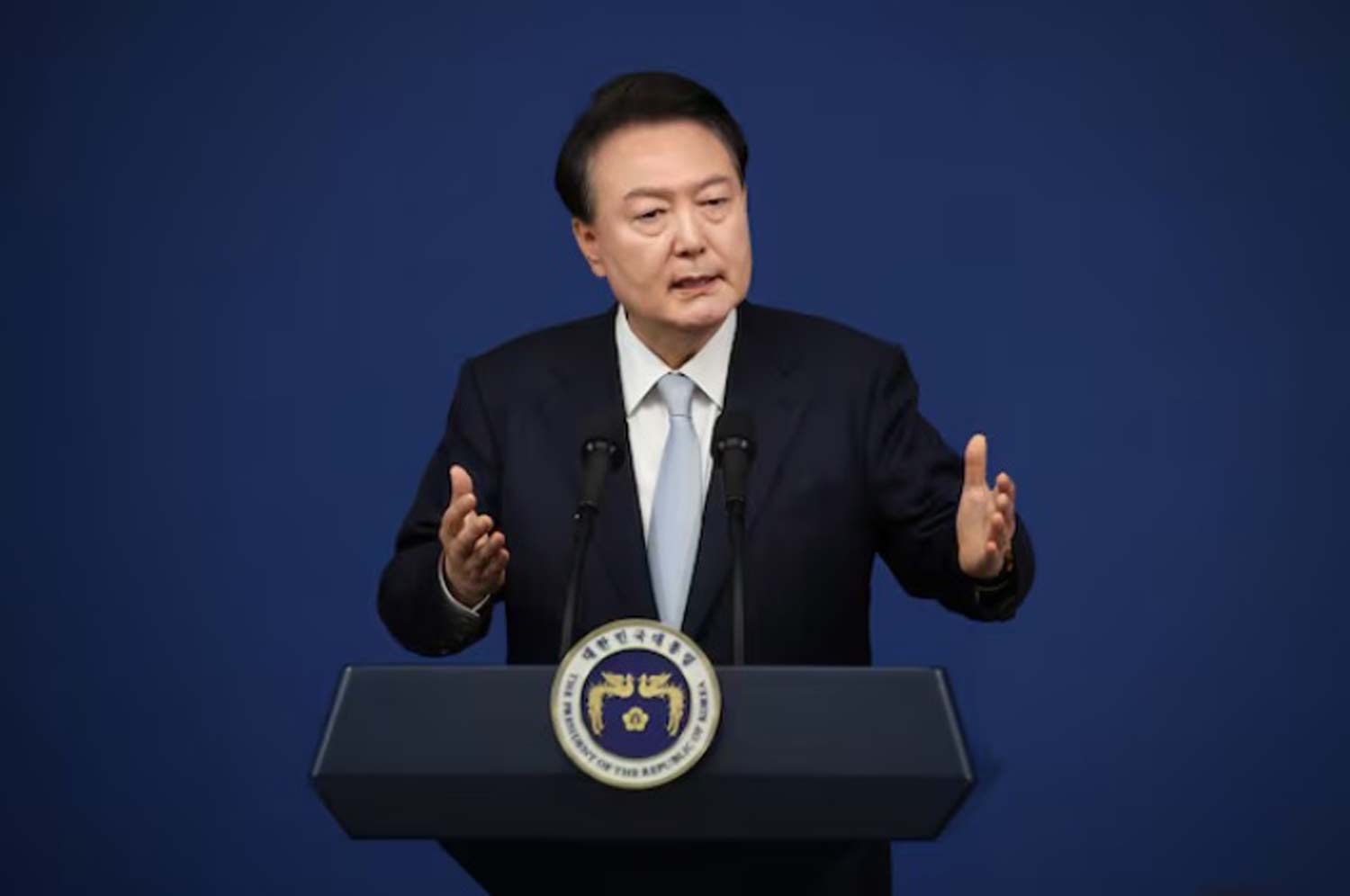South Korean President Yoon Suk Yeol has been prohibited from leaving the country following an unsuccessful attempt to impose martial law, as reported by a justice ministry official on Monday. This development comes amid increasing demands for his resignation and a worsening leadership crisis.
Yoon has expressed regret over the failed initiative and stated that he would leave his political and legal future in the hands of his ruling People Power Party (PPP), although he has not stepped down. Local media indicate that he is now under criminal investigation.
On Monday, the defense ministry confirmed that Yoon remains the legally recognized commander in chief. However, his authority is being questioned as dissent rises among senior military officials, and his party has announced plans to form a task force to manage his potential resignation. Oh Dong-woon, head of the Corruption Investigation Office for High-ranking Officials, confirmed that a travel ban has been imposed on Yoon during a parliamentary hearing regarding actions taken against him.
Justice ministry official Bae Sang-up informed the committee that the travel ban has been enforced. The panel, established in 2021 to investigate high-ranking officials, including the president and their families, lacks the power to prosecute the president directly and is mandated by law to refer such matters to the prosecutors’ office. Although Yoon survived an impeachment vote in parliament on Saturday, his party’s decision to transfer presidential powers to the prime minister has led to a constitutional crisis for the key U.S. ally.
Yoon has declined requests, including those from members of his own ruling party, to resign, and his prospects appeared increasingly precarious over the weekend following reports from Yonhap news agency indicating he is under criminal investigation for alleged treason.
On Sunday, prosecutors detained former defense minister Kim Yong-hyun in connection with his purported involvement in the declaration of martial law on December 3, as reported by Yonhap.
On that date, Yoon granted the military extensive emergency powers to eliminate what he termed “anti-state forces” and obstructive political adversaries. However, he revoked the order just six hours later after parliament voted unanimously against the decree, defying military and police barriers.
In response to the backlash, several military officials, including the acting defense minister, have stated they would not comply with any future orders to impose martial law.
The main opposition party, the Democratic Party, has called for Yoon to be stripped of his military command authority and has also demanded the arrest of Yoon and any military personnel involved in the martial law incident.
In light of the situation, Yoon’s People Power Party (PPP) has formed a task force to address issues related to “political stabilization following martial law and (Yoon’s) orderly early resignation,” according to a spokesperson on Monday.
PPP leader Han Dong-hoon announced on Sunday that the president would be sidelined from foreign and other state matters, with Prime Minister Han Duck-soo overseeing government operations until Yoon ultimately resigns.
The proposal has faced backlash from the opposition, which argues that it violates the constitution. They are calling for Yoon to either be impeached or to resign and face legal consequences, with plans to introduce another impeachment bill on Saturday. Chang Young-soo, a professor at Korea University’s School of Law, noted that while the president can delegate authority to the prime minister, particularly regarding military oversight, there is ongoing debate about the prime minister’s capacity to act as head of state in diplomatic affairs. He added, “Unlike the vice president in the U.S., the South Korean prime minister is not elected, which raises questions about democratic legitimacy. This raises concerns about the sustainability of this system.”
MILITARY REACTION
Opposition leader Lee Jae-myung cautioned on Monday that the ongoing political turmoil could inflict lasting damage on South Korea, the fourth-largest economy in Asia and a key global supplier of memory chips. The finance ministry and regulatory bodies in South Korea have stated their commitment to stabilizing financial markets by implementing contingency measures and enhancing liquidity by the end of December.
In a recent indication of unrest within military ranks, the commander of South Korea’s special forces revealed that he was instructed to deploy his troops to parliament last week to prevent a vote against martial law. Colonel Kim Hyun-tae, head of the 707th Special Missions Group, expressed that he accepted responsibility for his troops’ actions but was following orders from the then-defense minister, Kim Yong-hyun. “We were all victims who were manipulated by the former defense minister,” the colonel stated to reporters outside the defense ministry in Seoul.
He mentioned that he refrained from informing the military about his intention to speak with the media due to concerns that he might be prevented from doing so. Yoon’s choice to impose emergency rule and provide the military with extensive authority sparked protests in the streets and raised concerns among Seoul’s allies. U.S. Defense Secretary Lloyd Austin canceled his trip to South Korea, while Secretary of State Antony Blinken reached out to his South Korean counterpart, expressing his hope that the democratic process would prevail.
The United States maintains a presence of 28,500 troops in South Korea, a remnant of the Korean War from 1950 to 1953. The unrest in Seoul occurs at a critical geopolitical juncture, as North Korea is reportedly dispatching troops to support Russia’s efforts in Ukraine, amid increasing military cooperation between Moscow and Pyongyang. South Korean Foreign Minister Cho Tae-yul expressed his sorrow that this incident arose during a period of escalating security threats facing the nation.
Discover more from Defence Talks | Defense News Hub, Military Updates, Security Insights
Subscribe to get the latest posts sent to your email.





